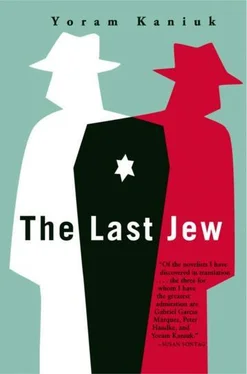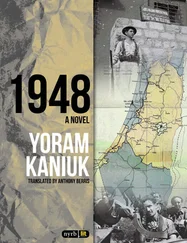Forty years, Ebenezer Schneerson didn't see his mother.
Tape / -
Your blood Dana. Your Dana blood. Blood blood. Your blood Dana. Dana Dana your blood. The blood of Dana. Dana. Blood blood blood Dana. Blood of Dana, blood. Blood your blood Dana Dana. Your blood Dana. Your Dana blood. Dana blood. Dana Dana. Your blood Dana. Blood.
They said I went to Marar to kill an Arab. I don't remember. I tell how I went to kill an Arab in Marar and I don't remember. An empty space I am. Stories of others or of others about me. Who am I? Forty years searching and don't know.
After forty years I came and saw him, and I said to him: Samuel! I was so happy that Samuel was here. But that was Boaz. He was offended. What do I know about Boaz?
Tape / -
Teacher Henkin met Boaz years after Menahem was killed. When he retired, there was nobody to say good-bye to. The teachers had changed. Damausz sat in his house and embroidered his old dreams over and over again. Old Teacher Sarakh with her swollen legs didn't even bother to come say good-bye to him. She grows silkworms and gazes at the sea getting blocked across from her house. Teacher Henkin bought a new overcoat and a broad-brimmed hat and every morning as usual, he went on walking from his house on Deliverance Street to Mugrabi Square, which had meanwhile been destroyed, and then back home again. "Grief of the world," Teacher Obadiah Henkin would say to himself at the new hotels, crushing the handsome hills at the seashore, the new houses, the discotheques, the banks popping up like mushrooms. Here and there, a few veteran teachers still live, Histadrut members, who now add a second story to their little houses and will soon sell the houses for accelerated development. Only the corner of Henkin's street remained lost between the new building sites closing in on it. They're wiping out the sea, dammit, said the baker's wife to Mr. Henkin, and he said, Yes, yes, too bad about Noga, thought Henkin, what's she doing? She lived with us, Hasha Masha and she, like two conspirators. A bare bulb over my wife, the garden hasn't yet been renewed, the paint is peeling. Unlike Hasha Masha, Teacher Henkin doesn't know that relations between Noga and Menahem-what he privately called their engagement-ended a few weeks before Menahem fell.
How many years does Teacher Henkin walk in that set route? He stopped counting. Ten, fifteen years? He's not sure anymore. The years are accompanied by demonstrations of hesitation, partial juggling of retreat, attempts to understand death from a new, unusual angle, getting to know the bereaved parents, the Committee of Bereaved Parents, the Shimonis, all that happened while he walked every single day, at the same time, on Ben-Yehuda Street to Mugrabi Square and back. Later on, after he'd meet Boaz, it became clear to Teacher Henkin that his son didn't fall in the battle of Mount Radar, but in a battle that would stir heroic feelings in him at first, that battle for the Old City. Teacher Henkin, who had had many illusions shattered in his life, was angry about the battle in the Old City, which might have been won if not for the order of Ben-Gurion, whom he had once thought great. But he wouldn't get his son back in either case, Hasha Masha will then say, and he'll stare at her, but then he won't be angry anymore at her hostility.
And so he also learned the battle for the Old City: the weary fighters of the Harel Brigade (and Menahem, he thought then, was one of them) bombarded Mount Zion every night from Yemin Moshe whose residents had previously been evacuated. And the mountain was captured. Menahem was in the armored car that climbed the mountain from the Valley of Hinnom. The fighters met in the Dormition Monastery, next to King David's Tomb, near the place of the seder the Christians call the Last Supper. After a short rest, the fighters were assembled in Bishop Gubat's school next to the monastery, and in the shadow of Byzantine acacias, they ate grape leaves stuffed with dry bread. From the other side of the narrow path separating the mountain from the Old City, on the splendid Tower of Suleiman sat the fighters of the Arab Legion commanded by British Colonel Wood. Colonel Wood, who graduated with honors from Eton and had a degree from Cambridge, had previously served in Europe, was one of those who liberated Hathausen concentration camp, fought in the Pacific, and then volunteered to help his old friend Glubb Pasha organize the army of the grandson of the Sharif of Mecca. Now he held a stick in his hand, which once, when liberating the camp, he refused to hold.
In the besieged Jewish Quarter, a handful of Jews remained, whose ammunition and food were running out. By order of Ben-Gurion, the governor of Jewish Jerusalem refused the offer of the rescue battle made by the members of the Harel Brigade. The governor claimed he didn't have reinforcements that the fighters of the Harel Brigade were exhausted and a considerable part of their fighters were killed or wounded. The commander of the Harel force decided to carry out the operation despite the governor's refusal, and that was a historical moment, thought Henkin excitedly. Ben-Gurion, who feared the rage of the fighters, approved the operation but at the same time he ordered the governor not to assist it. We need a historian, said Henkin, who will come and arrange the data, so that battle can be summarized properly. The commander said: We have to strike the enemy while he's stunned from the battle on the mountain. The night before, a hole was made in the roof of the Dormition Church by a Davidka shell that tried to hit a target far away from there and missed. The enemy had tanks, armored cars, and artillery. Colonel Wood relied on his weapons and his loyal soldiers. At dawn, an armored car approached the wall of the Old City and poured fire on the nearby Jaffa Gate. Seven Iraqi and British officers were taken prisoner. On Mount Zion sat Menahem along with Boaz. He wasn't thinking of the international conspiracies, of Ben-Gurion writhing in the torments of his decision, of the governor and his struggle with the commander of Harel, he was waiting to finish the war, go back home, live, then he got a cone of explosives and crawled toward Zion Gate. Over the gate were two heavy machine guns, whose range covered the narrow path and you had to slip under it. The explosive was connected to a wire and to the cone, and you could push it with a pole under the coil of the barbed war fence stretched there. At three twenty AM, on the twentieth of May nineteen forty-eight, the cone burst the fences, a mighty explosion was heard, shots were fired feverishly, and Zion Gate was breached. In the smoke of shooting and explosions, Menahem and his comrades burst into the city that previously, in a brief and laconic but emotional ceremony, the commander had called the Eternal City. In the short ceremony, the commander said in a restrained tone: One thousand eight hundred seventy-seven years ago we were exiled from here, you are the first to climb the wall of the Eternal City, hold on and embrace it. When Henkin will tell his wife about that, she will say to him: Is your pain less because of that?
Ra'anana ran first, followed by the rest of the fighters. A soldier who had laid explosives at the gate with Menahem lay wounded; later on they would pick him up. Menahem ran behind Boaz, shooting at the wall on which Colonel Wood's terrified officers and soldiers were fighting boldly. The Armenians, in the winding street to the Jewish Quarter, watch in awe, the fighters hold explosives, rifles, submachine guns, and food. The commander says on the walkie-talkie: They're losing control, complete surprise, send fighters to replace us, we're bleeding, if you send them fast, the Old City will be in our hands by nightfall, over and out. From the other end, there was no answer. Bearded, weary fighters burst out of the besieged Jewish Quarter. A brief but joyous encounter. Shells land on all sides. White flags start flying over the houses of the Old City. The Arab fighters are losing control and starting to flee, Colonel Wood can't hold his fighters. They're fleeing. Havaja Wood, they yell at him, nothing to be done, and he, stunned, waves the stick he's holding. You have to learn from the enemy, he'll say later on, and he doesn't mean Kramer, but Menahem Henkin.
Читать дальше












